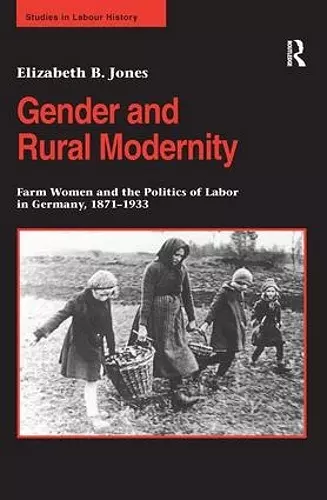Gender and Rural Modernity
Farm Women and the Politics of Labor in Germany, 1871–1933
Format:Hardback
Publisher:Taylor & Francis Ltd
Published:28th Feb '09
Currently unavailable, our supplier has not provided us a restock date
This hardback is available in another edition too:
- Paperback£52.99(9781138261921)

By the end of the First World War, women's labor was viewed by contemporary observers as fundamental to the survival of family farms in Germany and consequently to the nation's economic and social stability. At the same time, however, the overburdening of farm women sparked increasingly acrimonious conflicts between young hired women, or Mägde, their employers, and state officials. The progressive feminization of agricultural work in Germany during the prewar decades and attempts after the war to prevent young women's flight from family farms is the focus of this new study. Concentrating principally on developments in the Kingdom, later the Freestate, of Saxony, the author highlights the ways that previously invisible historical actors -young rural women- actively shaped state policies: in disputes over work between Mägde and their employers before village magistrates; in the thorny debates over rural social welfare reform and the campaigns to professionalize farm wives and daughters; and in state officials' uneven enforcement of agricultural employment laws and their struggles to maintain the food supply during and after the First World War. The book furthermore challenges established narratives of German history that equate modernity with the industrial and the urban, instead suggesting that rural inhabitants participated actively in the broader debates and crises that defined modernity in the Imperial and Weimar eras, particularly concerning debates over individual rights versus collective national duties, the future health and prosperity of the Volk, and the meanings of Germanness.
’This is a fascinating study which utilizes a range of official, published and archival sources and is sensitive to the need to give farm women some space to speak for themselves (where possible) and not be seen merely as subjects of contemporary debates or bystanders in political actions. ...Although it is in essence a local study, its subject matter and arguments make it relevant to major themes in agrarian history and women's history, as well as German history, and I would recommend it to anyone with an interest in any of these areas.’ Agricultural History Review ’... this book succeeds in challenging the conventional urban-rural construct by providing a persuasive account of "how farm women themselves shaped debates over their labor and the nation's future before, during and after the First World War" (p.2). ... It is to Jones's credit that she has been able to recover those lost voices and to fit them into more general debates about continuity and change in recent German history.’ Enterprise & Society ’Jones’ study succeeds admirably in substantiating her claim of the importance of the countryside in any consideration of German history. Well-grounded in the relevant historiography, it is strongest in its illumination of contemporary views on farm women’s productive labour... These women, almost invisible in prewar discourse, became so important to German agriculture that their overburdening came to be regarded as a threat both to the nation’s food supply and to its very existence.’ German History ’This is a groundbreaking work that enlarges our understanding, both of this large and previously little-known group of women and of the history of modern Germany and Europe.’ Central European History 'Overall, Jones makes a compelling argument for the importance of women's labor on German farms, and she presents substantial evidence that women both embraced change and attempted to create continuity. Gender and Rural Modernity is a valuable c
ISBN: 9780754664994
Dimensions: unknown
Weight: 630g
254 pages